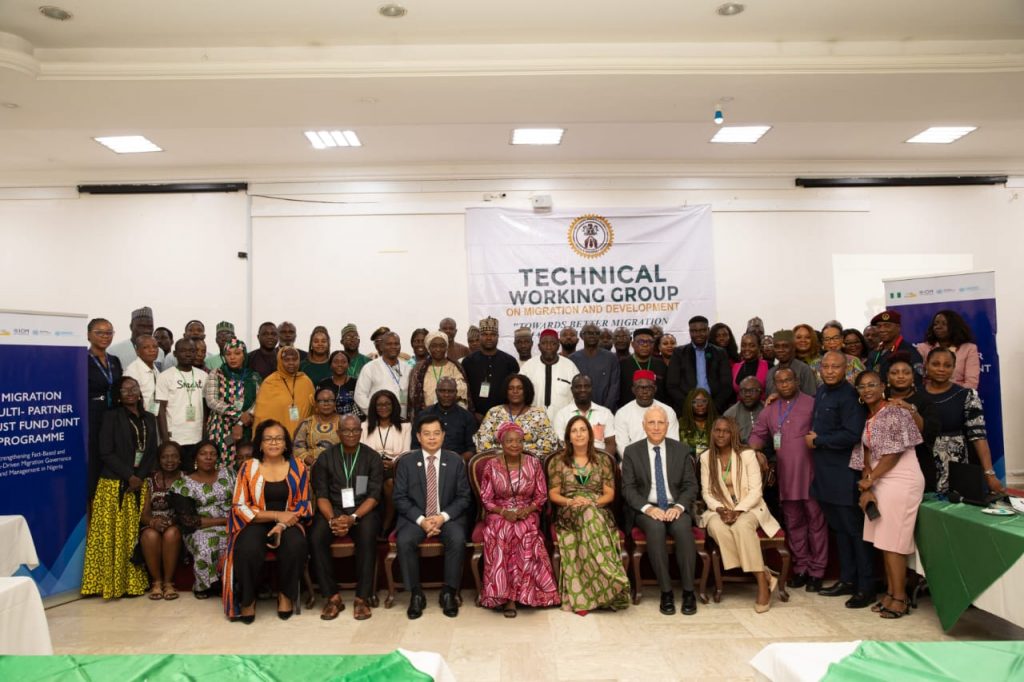Stakeholders in Nigeria have reaffirmed their dedication to developing a national migration policy that aligns with the country’s evolving needs and priorities. This commitment was made during the Technical Working Group meeting on migration and development for the National Migration Policy (NMP), facilitated by the International Organization for Migration (IOM) in partnership with the Migration Partnership Trust Fund.
The meeting, held in Abuja, aimed to bolster fact-based and data-driven migration governance in Nigeria. Participants underscored the necessity of updating Nigeria’s migration policy, originally implemented in 2015, to effectively address current migration dynamics. Aliyu Tijani, Federal Commissioner of the National Commission for Refugees, Migrants, and Internally Displaced Persons, emphasized the significance of this gathering in shaping the ongoing review of Nigeria’s migration policy. He expressed gratitude for the IOM’s support in facilitating the review process through the recruitment of a consultant and organizing essential workshops, consultations, and meetings.
“The current review process is vital to ensure our policies continue to be relevant and effective in addressing the evolving migration dynamics in our country,” Tijani stated. He also highlighted the efforts of the newly established review committee, comprising stakeholders from government, civil society, academia, and other sectors. This committee is committed to a thorough and meticulous review process that considers the complex and evolving nature of migration issues locally, regionally, and globally.
One of the primary objectives of the meeting was to share insights from previous workshops and expand the review scope to include emerging migration trends, challenges, and opportunities. Tijani stressed the need for policies that adapt to constant global changes to remain effective and efficient.
Paola Pace, Deputy Chief of Mission, IOM Nigeria, emphasized the importance of adaptive and inclusive policy frameworks in addressing the complex dynamics of migration. She reiterated the IOM’s commitment to supporting migration-related programs in Nigeria. Pace also noted that Nigeria’s migration policy, developed in 2015, serves as a comprehensive guide for managing various migration dimensions, including labor migration, diaspora engagement, and border management. The policy mandates a review every five years to ensure it remains relevant and effective.
International support was also highlighted during the meeting. The British High Commissioner to Nigeria, Richard Montgomery, and the German Ambassador to Nigeria, Annett Gunther, expressed their countries’ commitment to safe, orderly, and regular migration. They emphasized the need to combat human trafficking and support legal migration routes. Montgomery, represented by Yvonne Onabolu, stressed the importance of joint efforts in supporting safe and legal migration and holding those who profit illegally accountable. Gunther, represented by Roli Ukwu, commended the Nigerian government for its commitment to capturing new migration realities in the policy review.
As migration patterns and their attendant consequences continue to shift, stakeholders remain dedicated to refining Nigeria’s migration policy. The collaborative efforts underscore the importance of international support and adaptive policies in addressing the complexities of migration and promoting the well-being of migrants.
The review of Nigeria’s migration policy is seen as a critical step towards enhancing migration governance and ensuring that Nigeria’s policies remain effective in the face of changing migration dynamics. The commitment from both local and international stakeholders highlights the significance of creating a policy framework that effectively manages migration issues and supports the welfare of migrants.


